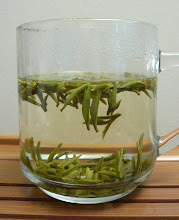Discussion on organic cultivation (2) is here.
It's a piece of news from Agricultural Department of Menghai County. It caught my eyes because it's about Zhang San (章家三队, the 3rd Team of Zhang - "team" is a residential unit in rural China), which, believed by many professionals, may have the best small tree (30-50 years old) puerh in Bulang region.
The news is about the recent pest outbreak. It's supposed to be a normal news. I would like to discuss on it here, because probably I am not the only one who would find it a bit odd, if reading between lines.
Here is a link with the news from the government website:
http://xxgk.yn.gov.cn/canton_model1/newsview.aspx?id=1620701
If you are interested, you can google translate the text. But I will briefly summarize it here.
1st paragraph: There is a pest outbreak involving multiple pest species. Economic loss is in millions of RMB and still increases.
2nd paragraph: Experts are working on it and training farmers to fight against the outbreak.
3rd paragraph: According to analysis of the experts, causes of the outbreak are: (1) Long-term shortage of management, including lack of trimming; (2) lack of fertilizer; (3) climatic factors.
4th paragraph: Currently, people are working on: (1) training farmers on harvesting, fertilization, trimming and pest prevention; (2) trimming off and removing dead and damaged branches with pests; (3) apply fertilizers to strengthen surviving trees; (4) apply pesticides efficiently, including using biological pesticide, application skills and applying all fields simultaneously.
Well, most of the experts' opinions, I can't say they are wrong. Although we don't like to see pesticides, at a pest outbreak, in order to save the whole village's production, probably that's the only choice. And the experts did recommend some biological pesticide and application strategies. But overall, I feel I would expect more in-depth advice from the experts than above mentioned. Also, I got an impression that the experts' advice just focuses on the current pest outbreak, as if it were not connected to everything else. Or probably this is just what the reporter has taken from the experts - but even in that case, I am still shocked what a superficial view the reporter took out of a pest outbreak.
About the news report, what seems most odd to me is the third paragraph. From a consumer's view, I feel what the experts said about "shortage of management" (lack of trimming, letting the tree grow on their own...) is ideal situation for puerh. Thinking positively - what these experts said make me like my own stock of Zhang San tea even more :-D Thinking negatively - are the experts blaming farmers' way of cultivation for the pest outbreak? :-( Do people think pest outbreak will not happen when "right" management is used?
I think it's fine that the experts train the farmers about everything mentioned in the 4th paragraph in response to such an emergency situation. But as for long term cultivation and management, I doubt the experts are qualified to teach the farmers. Zhang San is a place with tradition of tea production throughout generations. Many tea professionals comment that in Zhang San, farmer's processing skills for Mao Cha (raw tea before compression) are respectable, which makes me think usually the farmers know how to grow tea well before they know how to process tea well. Zhang San is also one of the numerous villages in Yunnan that hadn't even seen pesticides or other modern agricultural technologies by early 1990s.
In China, organic movement is at its beginning stage. As much as I like the idea of organic movement, I always feel some concern about it. While agriculture of some crops in some areas is being converted from non-organic to organic, the opposite is also happening, as it has been happening world wide since the so called "green revolution" in agriculture. My concern is, if all the focus of organic movement is on conversion "from conventional to organic", and not enough prevention action is taken on the change from traditional "cleaner" agriculture to "modernized" agriculture, then we may see some kind of polarization in the future - small amount of agricultural products are made purely organic, and very expensive; meantime, most other agricultural products are made very non-organic, and consumed by most ordinary people. Such polarization is already more or less happening in developed countries. But when it happens in China, it can be much, much worse.
In recent years, food safety of agricultural products in China have caused a lot of concerns nationally and internationally. But it remains a challenge how to address these concerns. In many discussions among Chinese scholars, media workers and officials, strengthening inspection standards and educating farmers are stressed. I have no problem with the first point. As for educating farmers, generally speaking, I think it's necessary and a right thing to do. But then, I think we should also be very cautious on this. In some areas, maybe we have a lot more to learn from the farmers than to teach them. In some other areas where agricultural practice is very unfriendly to the ecosystem, while educating farmers is important, it's as important to examine what have been taught to the farmers in the past 20 years. Many of the unsustainable agricultural practices we blame today, were taught to the farmers as new technologies and blissful means toward "agricultural modernization". Some of the eco-friendly practices we've learned as new lessons today, were known to the farmers 100 years ago. Experts and educators should always be careful what they teach to the farmers.
六堡茶道美学煮茶
3 years ago





























3 comments:
From my understanding of ecology, pest outbreaks are an inevitable result of bad farming practices that ignore the way ecosystems work. Pests are rarely a problem unless you have a monoculture or use cloned plants.
While cloned cultivars (genetically-identical plants grown from cutting rather than seed) are attractive as they preserve the original plant's characteristics, they are not sustainable because the plant never evolves, whereas pests are continuously evolving.
When cloned cultivars are grown in massive monocultures, it's just inviting pests to evolve and it's asking making massive crop failure to happen as soon as possible. Cloned cultivars can be grown for hundreds of years without pests evolving resistance, but only if they're used sparingly, and placed between barriers of other crops or (ideally) natural ecosystems, so that pests can't hop from one area to the next, and so that pest outbreaks are quickly controlled by birds and other insects that eat them for food.
I say this with confidence: sythetic pesticides are never necessary in the long-run if proper farming techniques are used.
I understand that there's human suffering involved, but why is it that we point to pests as the problem and pesticides as the solution? The problem is unsustainable farming practices, monoculture and the use of cloned plants. The solution is sustainable farming practices: using a smaller portion of your land, mixing crops, growing plants from seed. This solution can completely eliminate the need for all synthetic pesticides in the long-run. And it's the only solution I will ever wholeheartedly support.
I also think your comments about the "modernization" here are really insightful. I wish more would take this critical perspective!
Hi Alex, you are absolutely right that pest outbreak is a part of nature too, and sometimes human interference only makes it worse. It's very human-centered to think we have to beat all the pests and be the winner all the time. Such way of thinking causes many disasters on ourselves and very likely on future generations.
Post a Comment